A review of the Care Referendum due to take place on 8th March 2024
1. A brief overview of the Care Referendum
On 5 December 2023, the General Scheme of the proposed 40th Amendment of the Constitution (Care) Bill 2023, was published (a General Scheme is the draft heads of a proposed Bill).
On 6 December 2023, Roderic O’Gorman TD, sought and was granted a waiver from pre-legislative scrutiny.
On 7 December 2023, the Government approved the publication of the proposed 40th Amendment of the Constitution.
On 8 December 2023, the 40th Amendment of the Constitution was published.
As of 20 February 2024, the 40th Amendment of the Constitution is currently at the 3rd stage in the Seanad having completed 8 out of 11 stages in a matter of weeks (and having completely bypassed the pre-legislative scrutiny stage) – all in a bid to ensure the vote takes places on International Women’s Day on 8 March 2024.
The Explanatory Memorandum to the Bill states that the purpose of the Bill is to propose to: “… delete the current wording of Article 41.2 ……and insert a new Article 42B into the Constitution that recognises family care.”
Roderic O’Gorman TD, has said that the present wording of Article 41.2: “seeks to contain women in a very singular role, a role that’s completely divorced from the reality of women’s lives, women’s careers across our State today”
In short, the purpose of the proposed amendment is to remove the special protection that Mothers enjoy under the Constitution whereby the State guarantees to endeavour to ensure that Mothers are not forced into the labour market due to economic necessity, and to replace this with a gender-neutral requirement upon the State to “strive” to support care between family members
What is Pre-Legislative Scrutiny?
– Pre-legislative scrutiny is a process by which the Dáil and Seanad scrutinize draft Bills (meaning the General Scheme of a Bill) – and report back with observations and/or recommendations to the Minister sponsoring the legislation.
– Pre-legislative scrutiny was first introduced into the Houses of the Oireachtas following the 2011 General Election, as part of negotiations between coalition-partners during the formation of the then Government, following calls for parliamentary reform in light of the economic and banking crisis.
– The requirement for pre-legislative scrutiny was formally adopted into Dáil and Seanad Standing Orders as a requirement for Government Bills (“save in exceptional circumstances”) in November 2013, a reform which was retained by the 32nd Dáil in 2016.
– This reform was considered necessary due to the perceived weakness of the Houses of the Oireachtas in terms of executive oversight and political and institutional capacity to influence the Government’s legislative agenda (note that when we talk about the Government we mean the Cabinet, which is made up of a group of senior ministers responsible for the executive power of the State. Article 28 of the Constitution states that the Government may consist of no less than 7 and no more than 15 members, namely the Taoiseach, the Tánaiste and up to 13 other ministers).
– The fear was that the Government (meaning a maximum of 15 people) were effectively running the country, without any real oversight, from any of the other elected representatives.
– As a means of responding to this lack of oversight, it was agreed to introduce pre-legislative scrutiny as a mechanism by which the Dáil (meaning all TD’s) could have meaningful involvement in the drafting of proposed legislation before it became a Bill, thereby giving them real and substantive influence in the law-making process.
– The 2016 Programme for Government stated: – “We will support mandatory pre-legislative scrutiny for all new bills and post enactment review of legislation by Oireachtas Committees”.
– In light of this commitment, the 2016 Standing Orders (which are simply the rules which govern the work of the Dáil) included the mandatory requirement for pre-legislative scrutiny at Rule 146A.
– When the 32nd Government of Ireland took office in June 2020, their Programme for Government and thereafter their Standing Orders significantly diminished the requirement for pre-legislative scrutiny:
– which from 2016 onwards could only be waived “in exceptional circumstances;
– to permitting a waiver “in accordance with any guidelines agreed thereon by the Committee” (per new Standing Order Rule 30).
– As stated earlier, in the case of this proposed amendment to the Constitution, Roderic O’Gorman TD, sought and was granted a waiver from pre-legislative scrutiny on 6 December 2023 (noting that several TD’s raised this as an issue of significant concern during the Dáil debates on this Bill).
– If nothing else, this Governments disregard for effective and meaningful oversight of the legislative process should be a cause for concern, as should the speed at which this Bill has proceeded through the Dáil and Seanad.
– In relation to the manner in which the Government have railroaded this Bill through the Oireachtas, Senator Michael McDowell said the following: “first, I have to totally endorse what Senator Mullen has said about the guillotining of the Bill. It is disgraceful that it is being shoehorned through in the manner that it is. What was the hurry? I will tell the House what the hurry was. Some eejit in Government Buildings said there would be a better chance of getting this through if we say it is going to be held on International Women’s Day, 8 March. That is what happened. We got stuck with the ridiculous notion that this will help the Bill to go through and we will be seen to be “pro-woman” and doing something on International Women’s Day if we select that day for the vote on a referendum. As I said yesterday, that is a gimmick but it is a crude little gimmick. It is not the way a Constitution should be changed. It is shameful that that stunt was allowed to become a backstop in terms of time for considering change to our Constitution.”
2. Current wording of the Constitution
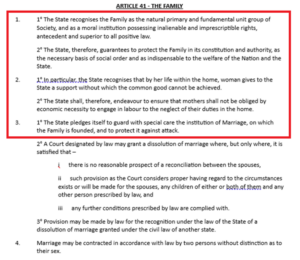
3. Proposed amendments to the Constitution
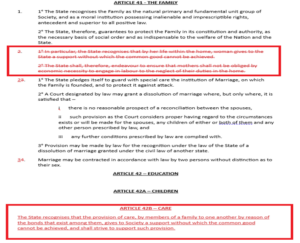
4. Previous proposals to amend Article 41.2 of the Constitution

5. Why the Government state the Constitution needs to be amended
The Government state that Article 41.2 (The Family) of the Constitution needs to be amended:
- to remove the archaic and sexist reference to a woman’s life, place and duties in the home;
- to recognise the value of the care and support which family members give to one another; and
- to create an obligation on the State to support those care relationships.
In reality, the Government are seeking to delete Mothers and Woman from the Constitution, most likely for ideological reasons and in doing so, they are disregarding the profoundly important role that Mothers play in the home, while also removing the special protection Mothers are afforded with regard to working outside the home due to economic necessity, as opposed to choice
5.1 The Government say the Constitution needs to be amended to remove the archaic/sexist reference to a woman’s life, place and duties in the home
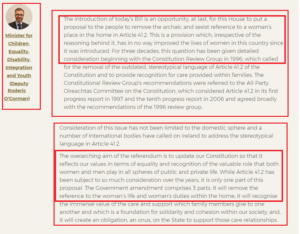
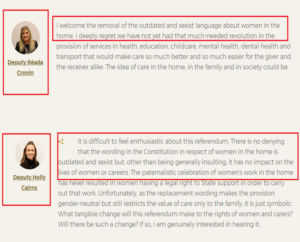
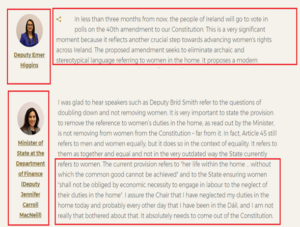
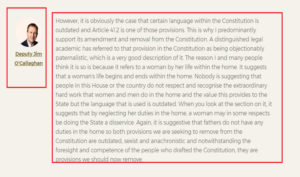
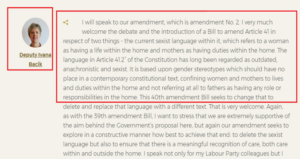
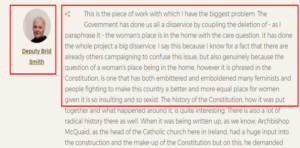
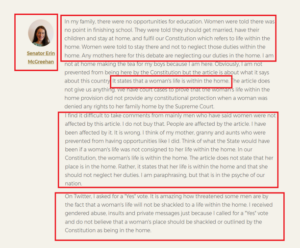
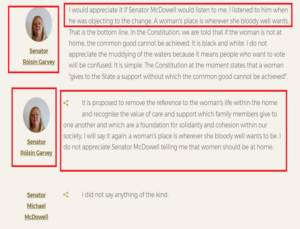
5.2 The Government say the Constitution needs to be amended to recognise the value of the care/support which family members give to one another and to create an obligation on the State to support those care relationships
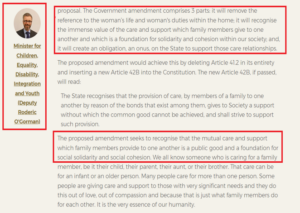
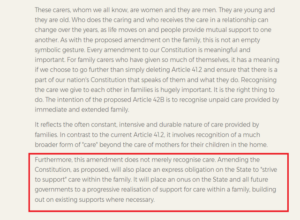
In summary, TD’s, Senators have stated the following:
- “The introduction of today’s Bill is an opportunity …. to remove the archaic and sexist reference to a woman’s place in the home”
– (Roderic O Gorman TD) - “A distinguished legal academic has referred to that provision in the Constitution as being objectionably paternalistic …. The reason I and many people think it is so, is because it refers to a woman by her life within the home. It suggests that a woman’s life begins and ends within the home.”
– (Jim O’Callaghan TD) - “I … welcome the debate and the introduction of a Bill to amend Article 41 in respect of two things – the current sexist language within it, which refers to a woman as having a life within the home and mothers as having duties within the home……It is based upon gender stereotypes which should have no place in a contemporary constitutional text, confining women and mothers to lives and duties within the home…”
– (Ivana Bacik TD) - “The Government has done us all a disservice by coupling the deletion of – as I paraphrase it – the woman’s place is in the home with the care question….. the question of a woman’s place being in the home, however it is phrased in the Constitution, is one that has both embittered and emboldened many feminists …”
– (Brid Smith TD) - “It is proposed to remove the reference to the woman’s life within the home ….I will say it again: a woman’s place is wherever she bloody well wants to be. I do not appreciate Senator McDowell telling me that women should be at home”
– (Senator Róisín Garvey)
6. In the Media
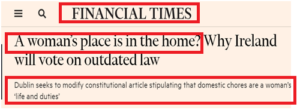


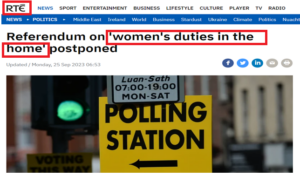
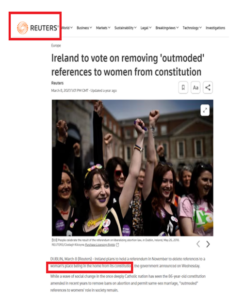
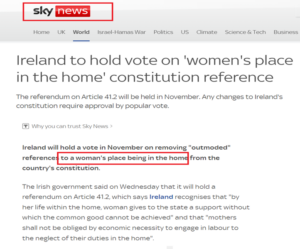
7. What does the Constitution actually say in relation to a woman’s life, place and duties being in the home 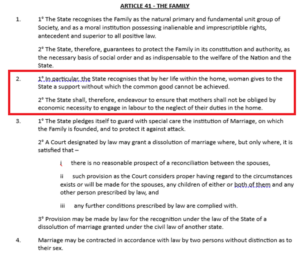
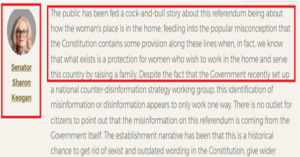
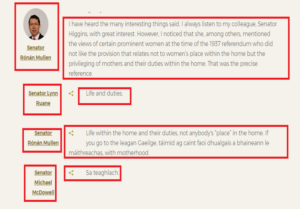
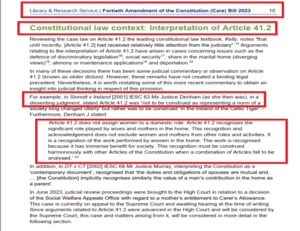
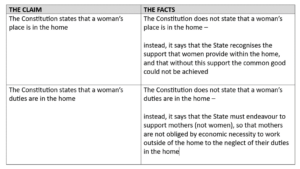
8. What impact does the lack of gender neutral language have on women, in terms of their stated duties in the home under Article 41
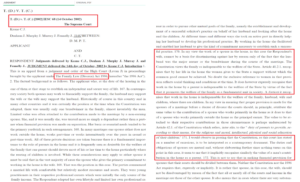
9. Deletion of protection offered to Mothers – in relation to being forced to work outside the home, due to economic necessity
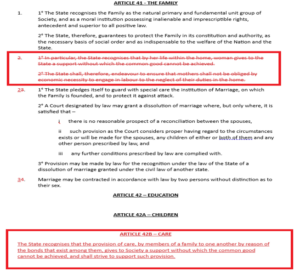
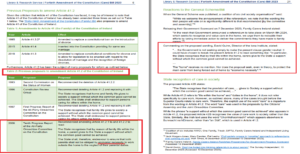
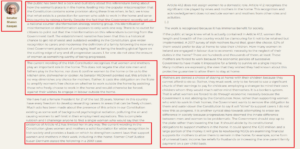
10. Which sex predominantly carried out care work, both inside and outside the home
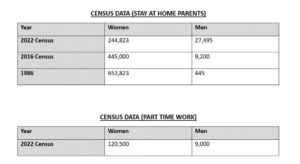
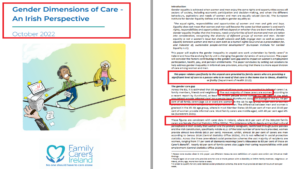
11. What are the views of Mothers in relation to caring for their children

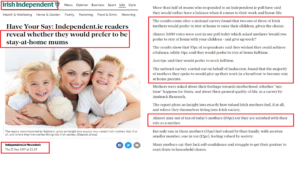
12. Incentives and schemes to ensure Mothers return to the workforce
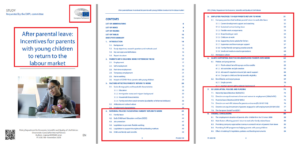
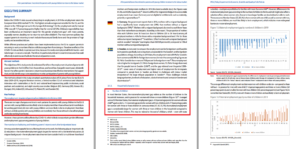
13. What impact will the new Care provision in Article 42B have, in terms of supports for Carers?
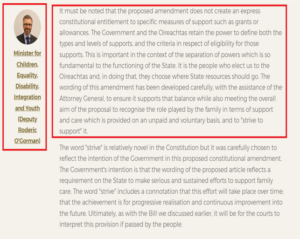
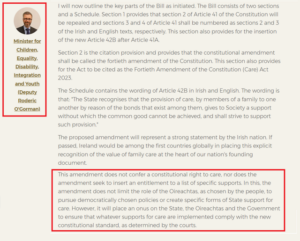

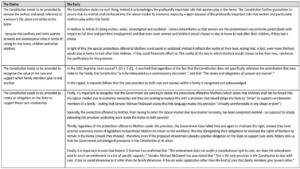
14. Potential consequences of a Yes Vote
14.1 – Erasure of Mothers and Woman (possibly for ideological reasons)
All reference to both “Mothers” and “Woman” will literally be deleted from the Constitution, in this regard it is worth noting that during the two Dáil debates that took place on this Bill, terms like gender equality, gender identities, and transgender were mentioned 35 times by Roderic O’Gorman (Greens), Sorca Clarke (SF), Ivana Bacik (Labour), Jennifer Carroll MacNeill (FG), Holly Cairns (Soc Dems), Bríd Smith (PBP), Emer Higgins (FG), Joe Flaherty (FF), James Browne (FF), noting that the majority, it not all of these TD’s take an ideological view on Gender, believing it to be a “social construct,” and not a biological fact worthy of protection
14.2 – To Delete the Special Protections Guaranteed to Mothers under the Constitution
The Constitution currently acknowledges the profoundly important role that Women play in the home and guarantees to ensure that no Mother shall be forced into the labour market due to economic necessity
In this regard, former Supreme Court Judge Brian Walsh, expressed astonishment more than 40 years ago, that no one had brought a constitutional case on behalf of Mothers who were forced into the labour market due to economic necessity
If this referendum is passed, no such challenge could ever be mounted, given that all protections guaranteed to Mothers with regard to working outside of the home will be deleted
14.3 There will be No Positive Impact for Carers
The new Article 42B (Care) is the only constitutional provision for people with disability.
However, this Article restricts care to the kind of care that is given by one member of a family to another by reason of their bonds of loyalty. It does not extend obligations to the State or to the wider community.
As Senator Michael McDowell has stated: – “It does not even say it will assist them; it says it will “strive” to do so. It is, therefore, virtually unenforceable in any shape or form.”
Link to video presentation: https://youtu.be/NbzOQiSR7yI?si=9DxydLMAPvJpLkUu
If you would like a copy of the Powerpoint to this presentation, please email [email protected]




